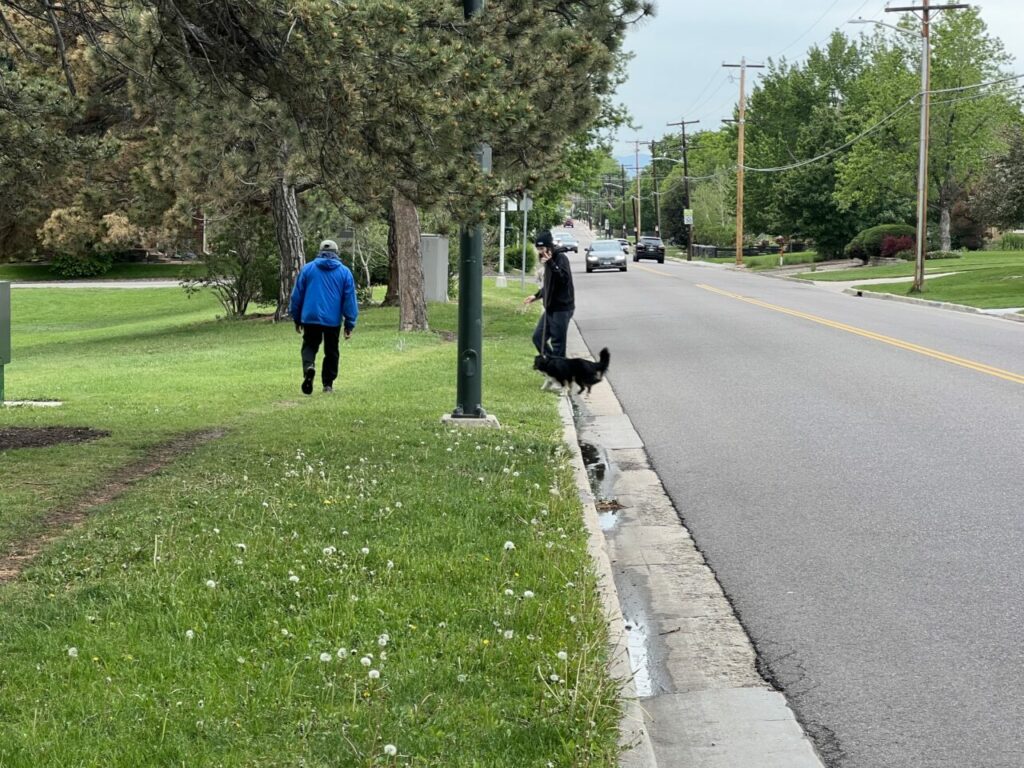By Allen Cowgill
Local nonprofit the Denver Streets Partnership (DSP) is gathering signatures for a ballot measure that proposes to complete Denver’s sidewalk network and secure funding to keep sidewalks in good repair.
According to the group, 10% of Denver residences have no sidewalks, and 30% of Denver residences have substandard sidewalks that are too narrow for use by residents with wheelchairs, strollers, or walkers. The effect is felt harder in low-income neighborhoods of Denver, where 47% of streets have missing or substandard sidewalks.
At current levels of funding, it could take just shy of 400 years to complete the sidewalks network. Jill Locantore, the executive director for DSP, has been working on this sidewalk campaign since 2015. She has heard community feedback across the city, from local groups like registered neighborhood organizations to the citywide Inter Neighborhood Cooperative, that there is a desire to complete the sidewalk network in a more timely manner.

Having grown frustrated with the slow progress the city is making, Locantore thought it was time to put it in front of the voters to decide. If successful in gathering enough signatures, the proposal will show up on the November Denver ballot.
If passed, the proposal says that every Denver neighborhood will have a complete sidewalk network within nine years. This not only includes filling in missing segments of sidewalk, but also includes bringing narrow sidewalks up to standard width. The funding would continue in perpetuity to maintain the sidewalk network, with an assumption that every sidewalk in Denver would need to be replaced about once every 75 years.
Locantore said another major benefit will be that residents will no longer be financially responsible for repairing their own sidewalks.
“That creates a huge financial burden for a homeowner, it can cost thousands of dollars to repair a sidewalk in front of a house,” she said. The costs can vary wildly, but she has heard cases of homeowners having to pay $10,000 or more for sidewalk repairs.
The proposal “directs DOTI (the Denver Department of Transportation and Infrastructure) to use the existing plans that have already been developed to prioritize the build out and repairs of sidewalks,” Locantore said. “So both the Vision Zero Action Plan and the Denver Moves Pedestrians Plans provides pretty clear guidance that we should prioritize first the high injury network, streets where most of the traffic fatalities are happening, followed by major transit corridors where this is just inherently a lot of pedestrian traffic because everyone is a pedestrian at some point to or from transit, followed by other high priority pedestrian destinations like schools and parks and grocery stores.”
In North Denver, Locantore says roads like Sheridan, Federal, West Colfax, Speer, 26th Avenue, 29th Avenue, and 38th Avenue would all see improvements quickly. The other benefit of this program is that neighborhoods like Inspiration Point or Chaffee Park that have missing or skinny sidewalks would be upgraded within the nine-year timeframe.
If passed, the ballot measure will impose a sidewalk fee based on the type of street a home is on as well as the width of the lot. This was inspired by Denver’s current stormwater fee that property owners pay each year annually based on the amount of impervious surface area on their lot. The average single-family homeowner on a residential street would pay about $9 per month via the proposed sidewalk fee.
Property owners in neighborhoods on Denver’s equity index, known as NEST, will receive a 20% discount. This would include neighborhoods like West Colfax, Sun Valley, Globeville, and Elyria-Swansea. Property owners that are on a fixed income will also have the opportunity to defer payment on the sidewalk fee until their house is sold.
The overdue sidewalk fee costs would then be paid at closing on the sale of their residence. This is a provision that DSP borrowed from Englewood, Colo., which has a similar program.
When asked about polling on the issue, Locantore didn’t have specific numbers, but said that a large portion of the community feels that “people believe that sidewalks are a basic piece of infrastructure that every neighborhood should have, and that should be publicly funded. Most people are actually surprised to learn that it is their responsibility to fix the sidewalk in front of their home, and they think that is a ridiculous way to maintain this basic asset in our city. We’ve just seen really overwhelming support from the community paired with a lack of political will at the city to do anything about it and so that’s why we felt let’s just take it to the voters and let them decide.”
She noted that a broad coalition of partners support this measure, including groups like the Colorado Cross Disability Coalition, CoPirg, Healthier Colorado, and others. Residents interested in learning more about the proposal or ways to get involved can find details at denverdeservessidewalks.wordpress.com.
Editor’s note: This piece was written prior to the deadline to get signatures for the ballot. As of the print deadline, DSP anticipated it would gather enough signatures to qualify for the ballot.

Be the first to comment